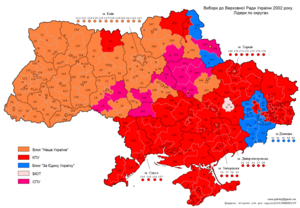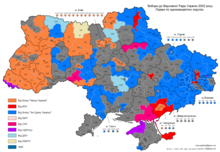2002 Ukrainian parliamentary election
| |||||||||||||||||||||||||||||||||||||||||||||||||||||||||||||||||||||||||||||
All 450 seats of the Verkhovna Rada of Ukraine 226 seats needed for a majority | |||||||||||||||||||||||||||||||||||||||||||||||||||||||||||||||||||||||||||||
|---|---|---|---|---|---|---|---|---|---|---|---|---|---|---|---|---|---|---|---|---|---|---|---|---|---|---|---|---|---|---|---|---|---|---|---|---|---|---|---|---|---|---|---|---|---|---|---|---|---|---|---|---|---|---|---|---|---|---|---|---|---|---|---|---|---|---|---|---|---|---|---|---|---|---|---|---|---|
| |||||||||||||||||||||||||||||||||||||||||||||||||||||||||||||||||||||||||||||
 Results of the 2002 parliamentary election. | |||||||||||||||||||||||||||||||||||||||||||||||||||||||||||||||||||||||||||||
| |||||||||||||||||||||||||||||||||||||||||||||||||||||||||||||||||||||||||||||

Parliamentary elections were held in Ukraine on 31 March 2002.[1] The Our Ukraine bloc emerged as the largest faction in the Verkhovna Rada, winning 111 of the 447 seats.[2]
The Organization for Security and Co-operation in Europe noted at the time that there were physical assaults and harassment of candidates and campaign workers associated with opposition political parties prior to the March election.[3] The Yulia Tymoshenko Bloc complained of campaign related violations including "an informal 'media blackout,' [and] negatively slanted coverage".[3]
Electoral system
Half of the deputies to Verkhovna Rada (parliament of Ukraine) were elected on proportional basis, while the other half were elected by popular vote in single-mandate constituencies.[4] In order to gain any (proportional) seats in Verkhovna Rada a party needed to receive at least 4% of the popular vote.[5]
Public opinion polls
| Polls | Our Ukraine | Communists | ZaEdU[6] | SDPU (o)[7] | BYuT[8] | Socialists | Vitrenko[9] | Greens | Zh/M[10] | KOP[11] | Apple |
|---|---|---|---|---|---|---|---|---|---|---|---|
| All-Ukrainian Social Service (3/31/2002)[12] | 22% | 20% | 14% | 8% | 6% | 5% | 3.5% | ||||
| Razumkov Centre (3/29/2002)[13] | 26-28% | 18-19% | 7-8% | 9-10% | 7-8% | 3.5-4.5% | 4-5% | 4.5-5.5% | 4-5% | 2.5-3.5% | 2.5-3% |
| Politic's Institute (3/29/2002)[13] | 29-32% | 19-21% | 6-8% | 7-9% | 4-5% | 4-5% | 5-6% | 4-5% | |||
| Ukrainian Institute of Social Research and Center "Social Monitoring" (3/27/2002)[14] |
23-25% | 17-19% | 11-13% | 10-12% | 5.5-7% | 3.5-4.5% | 3-4% | 4-5.5% | 4-5.5% | 2.5-4% | 2.5-3.5% |
| Center SOCIS (3/27/2002)[14] | 31-33% | 17-19% | 5-6% | 7-8% | 3-4% | 2-3% | 2-3% | 5-6% | 4-5% |
Incidents
On March 29, 2002 the Bloc of Yulia Tymoshenko won a case on defamation against the Chairman of the Tax Administration of Ukraine Mykola Azarov. The Shevchenkivsky District Court of the Kiev city prohibited the Tax Administration of Ukraine to spread lies against the opposition electoral bloc.[15]
Late at night on March 29, 2002 was mortally wounded a vice-governor of the Ivano-Frankivsk Oblast Mykola Shkriblyak. Shkriblyak was a member of the Social Democratic Party of Ukraine (united) and he ran for the Supreme Council (Verkhovna Rada) at the 90th electoral district. He died later in a local hospital.[16]
Results
Template:Ukrainian parliamentary election, 2002
The final election results differed greatly from the final opinion poll.[17] The 2002 parliamentary elections were the first that substantially reduced fragmentation of the Verkhovna Rada and laid the groundwork for consolidation of political views in the parliament.
Yushchenko's Our Ukraine gathered most of its support from western and central regions of Ukraine, including the city of Kiev. The Communist Party received most of its votes from eastern and southern regions, as well as from Crimea. For United Ukraine block, which included Victor Yanukovych's Party of Regions, got most of its votes from eastern regions of Ukraine. Donetsk Oblast was the stronghold of the block, where it received more than twice the number of votes (36.83%) compared to the next highest supporting region: Sumy Oblast with 17.05% of the region's voters. Yulia Tymoshenko's block's support came predominantly from western regions, while the Socialists were most supported in the central regions. While the Tymoshenko block received more of the national vote compared to the Socialist Party, it did not gain a plurality in any of the regions, while the Socialist Party managed to secure plurality of votes in Poltava Oblast with 22.05%.
Faction changes after 2002 election
After the election, several MPs left their parties to join another others.[18]
| Parties and alliances | Number of seats on 15 May 2002 | Number of seats on 19 October 2002 | Number of seats on 2 January 2003 | Number of seats on 16 September 2005 | |
|---|---|---|---|---|---|
| Viktor Yushchenko Bloc Our Ukraine | 119 | 110 | 102 | 45 | |
| Communist Party of Ukraine | 64 | 61 | 60 | 56 | |
| For United Ukraine | 175 | Disbanded | Disbanded | Disbanded | |
| Electoral Bloc Yuliya Tymoshenko | 23 | 20 | 18 | 40 | |
| Socialist Party of Ukraine | 22 | 21 | 20 | 26 | |
| United Social Democratic Party of Ukraine | 31 | 38 | 40 | 20 | |
| Source: Virtual Politics - Faking Democracy in the Post-Soviet World, Andrew Wilson, Yale University Press, 2005, ISBN 0-300-09545-7 & Ukraine on Its Meandering Path Between East and West by Andrej Lushnycky and Mykola Riabchuk, Peter Lang, 2009, ISBN 303911607X & Ukraine at the Crossroads: Velvet Revolution or Belarusification by Olexiy Haran, National University of Kyiv-Mohyla Academy, October 2002 | |||||
By October 2002 the For United Ukraine faction had broken down in 8 new parliamentary factions.[19]
References
- ^ Nohlen, D & Stöver, P (2010) Elections in Europe: A data handbook, p1976 ISBN 978-3-8329-5609-7
- ^ Nohlen & Stöver, p1991
- ^ a b Ukraine:Treatment of the Social Democratic Party of Ukraine (SDPU); relationship with the National Salvation Forum (FNB); treatment of FNB members, Immigration and Refugee Board of Canada via UNHCR (14 August 2003)
- ^ Against All Odds: Aiding Political Parties in Georgia and Ukraine (UvA Proefschriften) by Max Bader, Vossiuspers UvA, 2010, ISBN 90-5629-631-0 (page 93)
- ^ Ukraine at the Crossroads: Economic Reforms in International Perspective by Axel Siedenberg (Editor), Lutz Hoffmann, Physica-Verlag Heidelberg, 1999, ISBN 3790811890/ISBN 978-3790811896 (page 184)
- ^ For One Ukraine
- ^ Social Democratic Party of Ukraine (united)
- ^ Bloc of Yulia Tymoshenko
- ^ Bloc of Nataliya Vitrenko
- ^ Women for Future
- ^ Team of Winter Generation
- ^ Template:Uk icon "За ЄдУ" отримує свої 14%. У відповідному exit-poll (ZaEdU is receiving its 14%. In the respective exit-poll). Ukrayinska Pravda. March 31, 2002
- ^ a b Template:Uk icon Вибори-2002: остаточний прогноз (Elections-2002: the final forecast). Ukrayinska Pravda. March 29, 2002
- ^ a b Рейтинги переможців. Без табу (Ratings of victors. No taboo). Ukrayinska Pravda. March 27, 2002
- ^ Тимошенко виграла суд у Азарова (Tymoshenko won case against Azarov). Ukrayinska Pravda. March 29, 2002
- ^ Вбито кандидата в депутати від СДПУ(О) (A parliamentary candidate from SDPU (u) was killed). Ukrayinska Pravda. March 30, 2002
- ^ Ukraine's election frontrunners, BBC News (28 March 2002)
- ^ Virtual Politics - Faking Democracy in the Post-Soviet World, Andrew Wilson, Yale University Press, 2005, ISBN 0-300-09545-7
- ^ Ukraine at the Crossroads: Velvet Revolution or Belarusification by Olexiy Haran, National University of Kyiv-Mohyla Academy, October 2002






